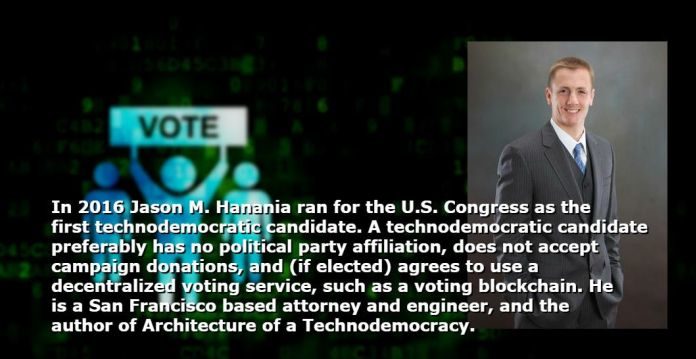[ad_1]
Jason M. Hanania is a San Francisco based attorney and engineer, and the author of Architecture of a Technodemocracy.
Blockchain News: What exactly is a technodemocracy?
Hanania: A technodemocracy is a government system that utilizes technology to decentralize governing power from individual group members to all group members. From rulers, or a handful of politicians and campaign donors, to 100 percent of those ruled. Culturally speaking, it decentralizes power from “the one percent” to “the 100 percent,” regardless of wealth, race, religion, or gender.
Blockchain News: How does a technodemocracy work?
Hanania: Two hundred years ago, asking people to vote on every political issue, using paper ballots, was among other things impractical. The process would have been too time-consuming. Republics made more sense, so a handful of representatives were elected to make decisions for everyone. Power was decentralized, from one person to the one percent. In a technodemocratic republic, elected representatives would make decisions based on documented evidence of majority interests, as provided for by a decentralized voting blockchain. That voting blockchain would be owned and controlled by the 100 percent. In a technodemocracy, each voter can vote on each and every political issue. They can also post new political issues and polls, and communicate peer-to-peer with other voters. Social priorities can be identified based on voter turnout.
Blockchain News: Is technodemocracy a form of egalitarianism?
Hanania: A technodemocracy is whatever its users want it to be. It’s customizable. Terms like egalitarianism, socialism, and capitalism, are propagated by centralized systems of government. They no longer matter in a decentralized system of government, like a technodemocracy. In a centralized system of government, power is eventually abused, regardless of whether the decision maker is a socialist, a capitalist, or something else. Decisions become self-serving. It’s human nature. Since math is a universal language, it’s easier to understand government systems using an equation for government power, rather than linguistics or “isms”.
Blockchain News: Is there an equation for government power?
Hanania: Government power is the summation of four powers – communication power, option power, decision power, and accountability power. In other words, for any group, group members must communicate, weigh options, make decisions, and hold group members accountable to decisions. The equation for government power tells us there are really only two systems of government, democratic and non-democratic. In a non-democratic system of government, these four powers are centralized in less than one percent of group members. In a democratic system of government, these four powers are decentralized, equally, to 100 percent of group members.
Blockchain News: How does technology factor into all of this?
Hanania: We’ve reached a threshold in human history where all four powers of government can be decentralized using technology. No violence is required. Specifically, communication power has been decentralized by computer networking technology, like the Internet and cellular networks. Option power and decision power have been decentralized by mobile technology, such as smartphones and mobile apps. And accountability power has been decentralized by distributed software technology, such as social media and blockchain. Blockchain can be used to decentralize all information, not just financial information. Bitcoin is just the tip of the iceberg. I’ve heard cryptocurrency experts use the term “decentralized trust.” What blockchain security technically provides is decentralized accountability power.
Blockchain News: Can’t software be hacked?
Hanania: Hacking isn’t unique to computers or software. Paper ballot elections, for example, have been hacked for centuries. If you put all the votes in one place, such as a ballot box, the election can be hacked by whichever central authority controls the ballot box. The problem is centralized information. Centralization empowers the middleman. Blockchain software decentralizes information. If you don’t understand blockchain, it helps to think of a blockchain as a spreadsheet. In the case of financial blockchains, like Bitcoin, every depositor is given a copy of the spreadsheet, not just one person, such as a bank accountant, bank official, or some other middleman. In the past, bank officials could fudge the numbers. In the case of voting using blockchain, every voter has a copy of the spreadsheet. An election hack would require fudging the numbers on a majority of the spreadsheets, which is impractical. Votes are tallied automatically, using encrypted voter-to-voter communications. Every voter can audit all of the voting results. There is no middleman. There is no centralized power. The underlying software is open source and can be audited by any voter at any time. Bitcoin has successfully provided us with a ten-year test drive for blockchain.
Blockchain News: What do you predict will happen in the coming decades?
Hanania: That depends on our priorities as a society. Do we prioritize profit or do we prioritize people? The equation for government power helps us predict the most important societal roles for blockchain. For example, communication power requires decentralized media. In the coming decades, Facebook and other corporate media networks could become obsolete. Option power requires decentralized commerce, so Amazon and traditional banks could become obsolete. Decision power requires decentralized voting, so elections could be controlled by voters, instead of by politicians or covert actors. Similarly, accountability power requires decentralized whistleblowing. WikiLeaks, for example, could become obsolete. Some corporations and government agencies are fighting with grim determination to own and control everyone’s personal information. We could continue to create bigger and badder versions of Google, Facebook, and Amazon; or we could instead create a decentralized user platform, stacked with a variety of blockchains offering search, social media, shopping, and so on. Such a platform would be free to use, self-funded through consensual advertising, owned and controlled by 100 percent of its users, and governed by a technodemocratic voting blockchain. On this type of platform, the design possibilities, for smart contracts and other social mechanisms, are endless.
Blockchain News: What concerns you about corporate blockchain?
Hanania: My concerns involving corporate blockchain overlap with artificial intelligence (AI) technology. We could use AI and blockchain to give people more option power. That is really the definition of freedom. We do not need technology making decisions for us, otherwise, decision power becomes centralized in the corporations and software developers creating that technology. For example, we don’t want AI overriding the pilot of the plane, like the plane that crashed in Ethiopia, we want AI to provide the pilot with options. The pilot then makes the decisions. If AI makes the decisions, the plane might be programmed to always take the most fuel-efficient course. It would save airline corporations fuel and increase profits. But if that AI-proposed course fails to factor in surface-to-air missiles, due to a civil war, the plane could get shot down. A human pilot should be vested with the decision power, not AI. This is why software developers need to understand government power.
Blockchain News: How will we know if technodemocracy is becoming a political reality?
Hanania: I think you’ll eventually see a technodemocratic politician elected to office. Constituents would then communicate with that representative using a voting blockchain. Each constituent would have an equal voice – one person one vote. Constituents would be unable to bribe that representative using campaign donations, and corporations would not have a voice on the voting blockchain. Corporations would only have a voice on a commerce blockchain, which is governed by the voting blockchain. Technodemocratic representatives would make decisions, on their respective congressional floors, based on documented evidence of majority interests. If representatives do not make decisions that reflect the documented interests of their constituents, they would presumably not get re-elected. In this way, voters can hold their representatives accountable to majority interests. It’s an evidence-based system. The voting blockchain would provide the evidence needed to enable decentralized government accountability.
Blockchain News: Why do you think technodemocratic voting blockchain would end political party systems?
Hanania: Once a technodemocratic representative gets elected to public office, majority interests would be documented for that representative’s entire jurisdiction. Voting blockchain could include data analytics which compares documented majority interests to every decision made by every representative. Both technodemocratic representatives and political party representatives could then be held accountable. This changes the game. Getting re-elected would depend on data analytics. In other words, politicians would have to pivot – from being accountable to campaign donors, to be accountable to voting blockchain.
- Jason Hanania: Architecture of a Technodemocracy – Author Interview – April 12, 2019
- Block.one’s FinLab EOS VC Fund Invests in Moonlighting – April 11, 2019
- Blockstack Files with SEC for Reg A+ Token Offering – April 11, 2019
- US Congress Introduces Bipartisan-Supported Token Taxonomy Act – April 10, 2019
- Facebook Allegedly Seeking USD$1 Billion VC for Cryptocurrency Project – April 9, 2019
- China to Ban Bitcoin Mining? – April 9, 2019
- Over $440M Orders Purchased – Gate.io Announces Gatechain Token (GT) Point Sale and GT Reward Distribution Results – April 9, 2019
- Bgogo Apollo Plans to Sell Algorand IOUs in an IEO, Without Permission – April 9, 2019
- Financial Stability Board Publishes Directory of Cryptoasset Regulators Across the World – April 8, 2019
- World-Class Cryptographers Team up to Build Agnostic Blockchain DCRM – April 8, 2019
- $50 Million Okta Ventures to Fund Modern Identity Solutions – April 8, 2019
- Vancouver’s Vanbex ICO Marketing Company has been Served – Property, Bank Accounts, Lambos and Land Rovers Seized – April 8, 2019
- SEC Releases Framework for “Investment Contract” Analysis of Digital Assets – April 5, 2019
- Minersinc Brings To India The Best Of World Cinema, Curates 200+ Critically Acclaimed Titles For Cinema Enthusiasts – April 3, 2019
- Berlin-based Brickblock Tokenizes Property in Europe in Private STO – April 2, 2019
- ARTEÏA launches Token Sale for P2P Art Market Blockchain Platform – April 2, 2019
- Russia’s Largest Social Media Network VK Eyeing Crypto – March 31, 2019
- Swiss Regulators say $90 million Envion ICO was Illegal – Liquidate and Return – March 31, 2019
- Euro Stablecoin to be Launched by Universal Protocol Alliance – March 31, 2019
- eToro Acquires Smart Contract Infrastructure Provider Firmo – March 25, 2019
Related
[ad_2]
Source link


